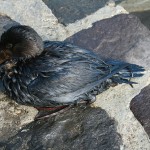Gov. Charlie Crist on Friday went back to BP for more money, saying that Florida must immediately begin to monitor the nature of the oil threat to the state’s environment and needs $100 million from the company to start.
 Crist’s request follows another earlier this week for $50 million from the British oil giant to pay for beach and marsh protection and to compensate responders for work to mitigate the spill. BP has also already agreed to help Florida advertise that its beaches so far have been unaffected – though with news that oily tarballs were showing up Friday on beaches around Pensacola, it’s not clear whether those ads will be useful.
Crist’s request follows another earlier this week for $50 million from the British oil giant to pay for beach and marsh protection and to compensate responders for work to mitigate the spill. BP has also already agreed to help Florida advertise that its beaches so far have been unaffected – though with news that oily tarballs were showing up Friday on beaches around Pensacola, it’s not clear whether those ads will be useful.
Friday’s request, sent in a letter to BP America President Lamar McKay, was for an additional $100 million to put in place a scientific monitoring system proposed by the Florida Institute of Oceanography. The governor sent McKay a detailed proposal laying out how the money would be spent.
“A critical component of this effort is the need to maintain an independent, real-time monitoring capability, and documentation of the evolving conditions in order to respond to the threats to Florida’s seabed, water column, surface and shoreline,” Crist wrote.
“The destructive spill is already having an impact on Gulf of Mexico coastal areas, and the threat to our state is real and imminent,” Crist continued. “If we are to adequately protect Florida’s economy and environment, we must act in a swift and organized manner to monitor, evaluate, and respond to the constantly changing conditions.”
Crist noted that BP recently announced it would put $500 million into independent research and evaluation of the impact of the leak that started after the April 20 explosion on the Deepwater Horizon oil rig off the Louisiana coast and continued this week. Crist also acknowledged that the company had said it wanted to appoint an advisory group to assess the various proposals for scientific monitoring of the effects of the spill. But, the vetting process can’t go on long, Crist said, because the damage is starting.
“Florida’s interests are urgent and unique,” Crist said. “Our state represents a substantial portion of the marine recreational fishing in America. Our wide Gulf shelf supports a multi-billion fishing industry, and the Florida keys are a national marine sanctuary. The potential impact of the spill on our economy, habitat, and coastal communities demands that our state have a leadership role in the response.”
The Florida Institute of Oceanography is a collaboration of 21 university and private marine science organizations based at the Gulf Research Port in St. Petersburg.
Among the questions the group would seek to quickly answer is where is the oil being taken by currents, and how is the oil behaving on the seabed, in the water column, on the surface of the Gulf and on shore? The money would go to pay for moored meters, observation platforms, drifting buoys and the sensor equipment to take various measurements, and autonomous lander vehicles, which dive deep into the ocean to record time-lapse photos of marine life on the deep ocean floor.
It also would pay the salaries of investigators, and for ships, aircraft and several other pieces of equipment needed to intensively study the situation in the Gulf.
By David Royse
The News Service of Florida


